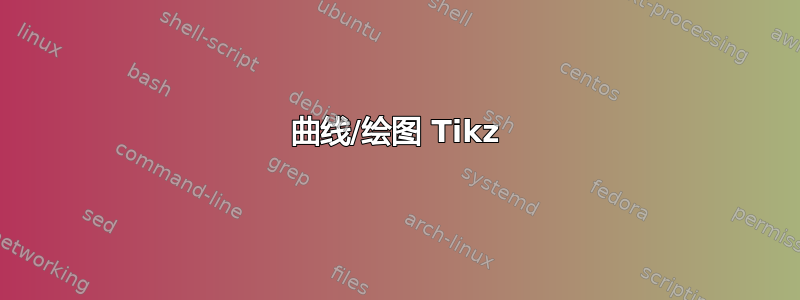
我正在尝试制作这张图表:
这是我目前所做的:
\documentclass[tikz, border=20]{report}
\usepackage{tikz,enumitem,multicol}
\usetikzlibrary{arrows}
\usepackage{pgfplots}
\usetikzlibrary{arrows.meta,intersections}
\pgfplotsset{compat=1.8}
\begin{document}
\begin{figure}[h]
\centering
\begin{tikzpicture}
\begin{axis}[ultra thick, axis lines=middle,
xmin=-5, xmax=5, ymin=0, ymax=4,
xlabel={\large $K$},
xlabel style={below right},
ylabel={\large $|y|$},
ylabel style={above},
yticklabels=\empty,
xticklabels=\empty,
xtick={0.01, 4},
xticklabels = {$ $, $ $},
]
\addplot[dashed, very thick, samples=300, domain=-3:0, name path=A]{-.75*x};
\addplot[very thick, samples=300, domain=0:3, name path=B] {.75*x};
\addplot[very thick, samples=300, domain=-1:1, name path=B] {x^2 + 1};
\addplot[very thick, samples=300, domain=0.1:3, name path=D] {-abs(x^0.5)/(x^2) + 1.5};
\addplot[very thick, samples=300, domain=-0.1:-3, name path=D] {-abs(x)/(x^2) + 1.5};
\end{axis}
\end{tikzpicture}
\caption{In this figure, we present the RG flow ...}
\label{fig:RG_flow}
\end{figure}
\end{document}
这是输出:
除了尝试使用 Tikz 猜测正确的函数之外,还有没有更好的方法?那么,我怎样才能将箭头放在曲线的中间?
谢谢!
答案1
在我看来,这些曲线就像双曲线。至少我认为它们看起来更像双曲线而不是抛物线。
你可以用 tikz 库中的装饰将箭头放在曲线中间decorations.markings。我在我的样式中包含的代码
mark=at position 0.5 with {\arrow{latex}}}
latex在你的道路中间放置一支箭。
我会这么做:
\documentclass[border=2mm]{standalone}
\usepackage {tikz}
\usetikzlibrary{decorations.markings}
\tikzset{%
my arrow/.style={
postaction={decorate,decoration={
markings,
mark=at position 0.5 with {\arrow{latex}}}
}}
}
\begin{document}
\begin{tikzpicture}[line cap=round,line join=round,thick]
% axes
\draw[-latex] (-4,0) -- (4,0) node [below] {$K$};
\draw[-latex] ( 0,0) -- (0,4) node [below right] {$|y|$};
% blue lines
\draw[blue,my arrow] (4,4) -- ( 0,0);
\draw[blue,dotted,my arrow] (0,0) -- (-4,4);
% red curve (hyperbola)
\draw[red,my arrow] plot [smooth,domain=4:-4,samples=41] (\x,{sqrt(2+\x*\x)});
% green curves (hyperbolas)
\draw[green!50!black,my arrow] plot [smooth,domain=4:0,samples=21] ({sqrt(2+\x*\x)},\x);
\draw[green!50!black,my arrow] plot [smooth,domain=0:4,samples=21] ({-sqrt(2+\x*\x)},\x);
% labels
\node at (0,0) [below] {$K_c$};
\node at ({sqrt(2)},0) [below] {$K^*$};
\node at (3,2) {(a)};
\node at (0,2) [right] {(b)};
\node at (-3,2) {(c)};
\end{tikzpicture}
\end{document}
编辑:与 pgfplots 相同的图:
\documentclass[border=2mm]{standalone}
\usepackage {pgfplots} % it loads tikz
\usetikzlibrary{decorations.markings}
\pgfplotsset {compat=1.17}
\tikzset{%
my arrow/.style={
postaction={decorate,decoration={
markings,
mark=at position 0.5 with {\arrow{latex}}}
}}
}
\begin{document}
\begin{tikzpicture}
\begin{axis}[%
thick,
axis lines=middle,
axis equal,
xmin=-4, xmax=4, ymin=0, ymax=4,
xlabel={$K$},
xlabel style={below},
ylabel={$|y|$},
ylabel style={below right},
yticklabels=\empty,
xtick={{sqrt(2)}},
xticklabels={$K^*$},
extra x ticks={0},
extra x tick style={
xticklabel style={below right},
xticklabel={$K_c$}},
xtick style={draw=none},
ytick style={draw=none}
]
% blue lines
\addplot[blue,dashed,my arrow] coordinates {(0,0) (-4,4)};
\addplot[blue,my arrow] coordinates {(4,4) ( 0,0)};
% red curve (hyperbola)
\addplot[red,my arrow,samples=41,domain=-4:4] {sqrt(2+\x*\x)};
% green curves (hyperbolas)
\addplot[green!50!black,my arrow,samples=21,domain=4:0] ({ sqrt(2+\x*\x)},\x);
\addplot[green!50!black,my arrow,samples=21,domain=0:4] ({-sqrt(2+\x*\x)},\x);
% labels
\addplot[mark=none] coordinates {( 3,2)} node {(a)};
\addplot[mark=none] coordinates {( 0,2)} node [right] {(b)};
\addplot[mark=none] coordinates {(-3,2)} node {(c)};
\end{axis}
\end{tikzpicture}
\end{document}
答案2
您可以近似您的函数,但这并不像图像上显示的定义函数那么困难:
\documentclass[border=2.141592]{standalone}
\usepackage{tikz}
\usetikzlibrary{arrows.meta,
decorations.markings}
\begin{document}
\begin{tikzpicture}[> = {Straight Barb[scale=0.8]},
->->-/.style={decoration={markings,% switch on markings
mark=at position 0.25 with {\arrow[line width=1pt]{>}},
mark=at position 0.75 with {\arrow[line width=1pt]{>}}
},
thick, postaction={decorate}
},
->-/.style={decoration={markings,% switch on markings
mark=at position 0.5 with {\arrow[line width=1pt]{>}}
},
thick, postaction={decorate}
}
]
% axis
\draw[->] (-3,0) -- (3,0) node[below left] {$K$};
\draw[->] ( 0,0) node[below] {$K_c$} -- (0,3) node[below left] {$|y|$};
% approximation of functions
\draw[->-] (3,2.5) -- (0,0);
\draw[->-, dashed] (0,0) -- (-3,2.5);
%
\draw[->->-] (-2,2.5) .. controls +(1,-2) and +(-1,-2) .. (2,2.5)
node[pos=0.75,above] {$(a)$};
%
\draw[->-] (-3,1) .. controls +( 1,-0.25) and +( 0,0.25) .. (-1,0)
node[pos=0.25,below] {$(b)$};
\draw[->-] ( 3,1) .. controls +(-1,-0.25) and +( 0,0.25) .. ( 1,0) node[below] {$K*$}
node[pos=0.25,below] {$(c)$};
\end{tikzpicture}
\end{document}






